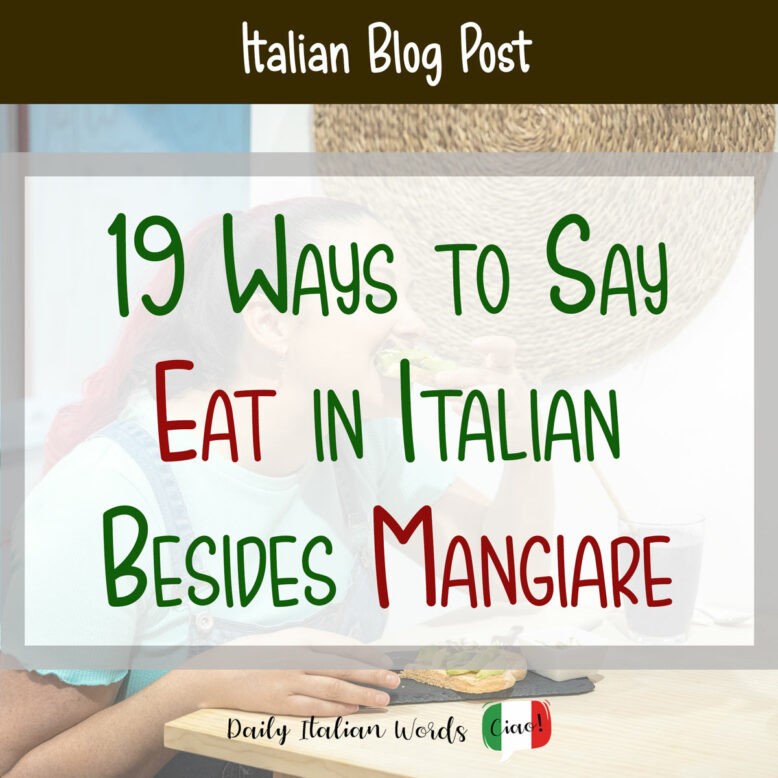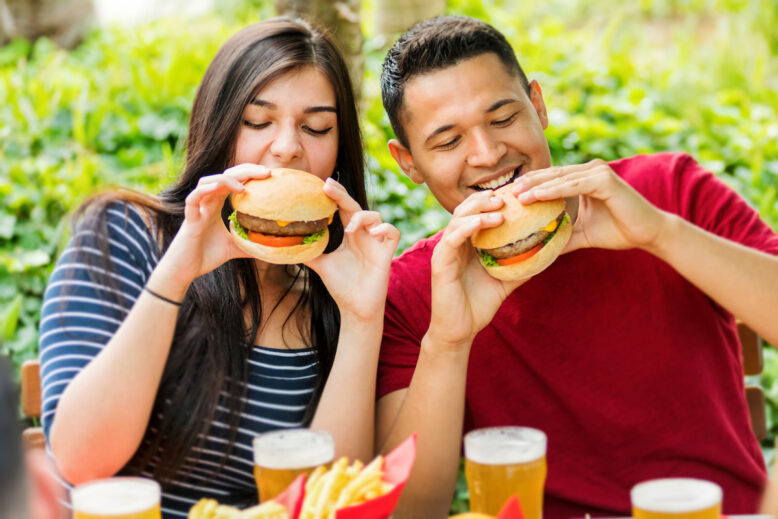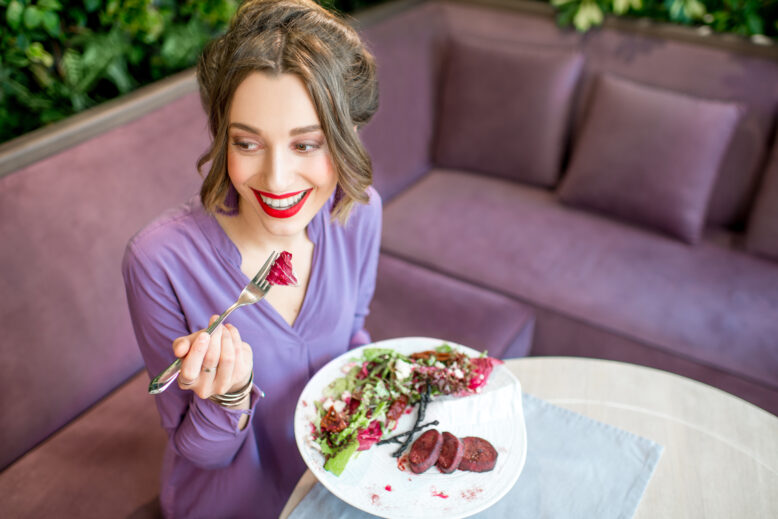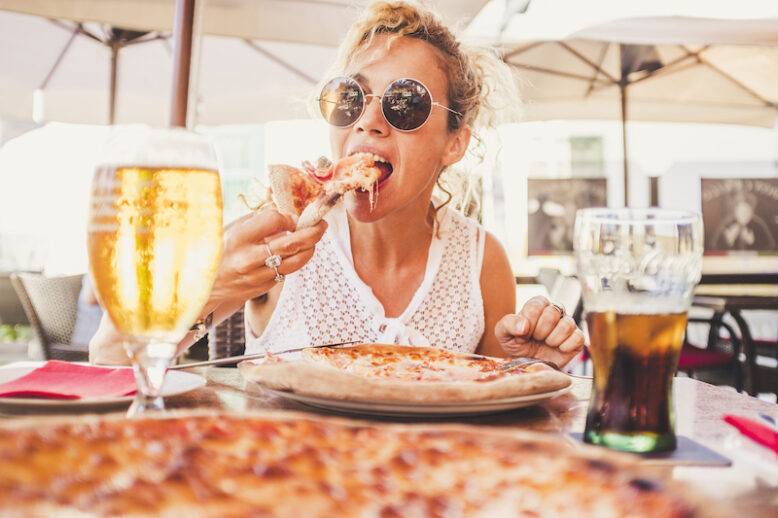There are those who devour their meals a quattro palmenti (with a hearty appetite) and those who delicately nibble at their plates come un uccellino (like a little bird); there are those known to be una buona forchetta (foodies) and then there are the health-conscious souls who opt for dining lightly and early, striving to vivere sano e lesto (live healthy and agile).
In short, eating is a physiological necessity (and one of life’s pleasures, if I may add), but there are loads of different ways to do it, each with its own expression. So, let’s explore some great ways to say “eat” in Italian that you might come across, from leisurely indulgence to quick refuelling.

Ethics statement: Within the article, there are affiliate links. If you buy something after clicking the link, we will receive a small commission. To know more about our ethics, you can visit our full disclosure page. Thank you!
1. Divorare (to devour)
This verb encapsulates the act of eating swiftly, leaving no trace behind. It’s for those moments when hunger strikes with such intensity that you could polish off a whole turkey in one sitting!
Ho una fame che divorerei un pollo intero!
I’m so hungry I could devour a whole chicken!
Figuratively, divorare describes consuming something rapidly, like: Amo il suo ultimo libro, l’ho letteralmente divorato. (I love his latest book, I literally devoured it.)

2. Trangugiare (to gulp down)
Trangugiare is another verb that paints a picture of swift eating, where you gulp down food so fast that chewing is just a formality.
Ho trangugiato un panino prima di riprendere il turno.
I gulped down a sandwich before continuing my shift.

3. Sbocconcellare (to nibble)
This curious verb denotes the act of eating small bites, usually with your fingers, maybe not because you’re really hungry, but just because. The word comes from sbocconcello, which is the diminutive of boccone, meaning bite or morsel.
Nell’attesa, ho sbocconcellato un panino.
While waiting, I nibbled on a sandwich.

4. Piluccare (to nibble)
Similar to sbocconcellare, piluccare is about nibbling away, but maybe with a touch of boredom thrown in. You know, when you’re not really hungry but you’re picking at your food anyway. It comes from the Latin word pilare, which means to peel.
Non ha mangiato molto, ha piluccato qua e là.
She didn’t eat much, she nibbled here and there.

5. Mangiucchiare (to nibble)
This verb is all about eating small amounts, maybe not feeling really hungry or just grabbing a snack between meals.
Non mi va di cenare, ho mangiucchiato delle patatine prima di tornare a casa.
I don’t feel like having dinner, I nibbled on some chips before coming home.
It’s also used with the meaning of biting something in expressions like mangiucchiarsi le unghie (to bite one’s nails).

6. Spizzicare (to nibble / to snack on something)
Spizzicare is when you enjoy some little treats between meals, savouring tiny bits of food or just tasting a little here and there.
Che ne dici di spizzicare qualcosa prima di uscire?
How about we snack on something before we head out?
Just a heads-up: If someone asks you this question in southern Italy, get ready for a feast!

7. Pappare (to gobble up)
Pappare is a playful verb that encapsulates the joy of devouring food eagerly and abundantly, like someone who can’t resist a tempting dish. Use it during informal exchanges only.
Si è pappato tutta la torta.
He gobbled up the whole cake.
Its noun equivalent is pappa, which refers to both a thick soup (like the famous pappa al pomodoro in Tuscany) or is used more generally when talking to children about food (è ora della pappa! – it’s mealtime!)

8. Rifocillare (to re-energize) / Rifocillarsi (to re-energize oneself)
This sweet-sounding verb comes from the Latin refocilare, meaning to revive. Basically, it’s like giving yourself or someone else a little energy boost through food or drink.
Dopo la lunga tappa ci siamo rifocillati con una bella zuppa calda.
After the long journey, we revived ourselves with a nice hot soup.

9. Sfamare (to feed) / Sfamarsi (to feed oneself)
Whether it’s feeding a family or simply satisfying your own hunger, this verb embodies the basic act of nourishment. In other words, it’s about taking away hunger and providing sustenance for yourself or others.
Luigi lavora molto perché ha cinque bocche da sfamare a casa.
Luigi works hard because he has five mouths to feed at home.

10. Abbuffarsi (to stuff oneself)
This way of saying eat in Italian is for when you really pig out. Curiously, it comes from buffa, which means toad in southern Italian dialects, hinting that you might swell up like a toad after a big meal.
Stasera andiamo ad abbuffarci di sushi.
Tonight we’re going to stuff ourselves with sushi.
You might also hear the noun abbuffata, like Dopo l’abbuffata di Natale, ho proprio bisogno di mettermi a dieta. (After that Christmas binge, I seriously need to diet.)

11. Strafogarsi (to gorge oneself on)
Strafogarsi is just like abbuffarsi – it means stuffing yourself silly. It comes from affogarsi (to drown), expressing the idea that you’re eating so much you might as well be drowning in food!
Durante le vacanze in Italia ci siamo strafogati di pasta e pizza.
During our vacation in Italy, we gorged ourselves on pasta and pizza.

12. Rimpinzarsi (to gorge oneself on)
Rimpinzarsi also means eating excessively, to the point of not being able to eat anymore. However, while abbuffarsi conveys the image of throwing oneself onto food (think of a buffet frenzy), rimpinzarsi and strafogarsi have more to do with filling your own body with food.
Non vedo l’ora di andare in Sicilia e rimpinzarmi di cannoli!
I can’t wait to go to Sicily and gorge myself on cannoli!

13. Saziarsi (to satisfy one’s appetite)
Saziarsi means eating enough to fill your belly. It comes from the Latin satis, which means enough, precisely conveying the idea of hitting the spot just right to satisfy your hunger or cravings.
Con quel piatto di pasta mi sono saziato per tutta la giornata.
With that plate of pasta, I was good for the whole day.
You can also use it as a non-reflexive verb to talk about food that’s very nutricious and fills you up, like l’avena sazia a lungo (oats keep you full for ages).

14. Assaggiare (to taste)
Assaggiare can have two meanings. It can mean eating just a bit of food, like La carne l’ha solo assaggiata (He only had a taste of the meat), or trying a little nibble to see if it tastes good or is cooked right, like Hai assaggiato la pasta? Dovrebbe essere cotta ormai. (Did you taste the pasta yet? It should be done by now.)
Ho assaggiato la torta e mi è piaciuta molto.
I tasted the cake and I really liked it.

15. Sgranocchiare (to munch)
Using sgranocchiare to say eat in Italian is perfect to convey the idea of munching on something crispy – not because you’re starving, but just because you feel like it. In other words, it’s like having a snack to chew on although you’re not really hungry.
Preparo dei popcorn da sgranocchiare durante il film.
I’m making popcorn to nibble on during the movie.

16. Ruminare (to chew slowly)
Ruminare is the perfect verb to use when someone’s chewing their food super slowly, like they’re channeling the unhurried grace of a contented cow! The verb refers precisely to the unique way ruminant animals like cows chew their food methodically to stimulate digestion.
È mezz’ora che rumini, non ti piace?
You’ve been chewing that for half an hour, don’t you like it?

17. Cibarsi (to feed oneself)
Cibarsi simply means to eat, without any special connotations. It’s not super common in everyday Italian, but it’s good to know.
Le api si cibano di nettare e polline.
Bees feed on nectar and pollen.
Sometimes, you might hear cibarsi used figuratively, like in the beautiful phrase cibarsi dei sogni (feeding oneself on dreams) by Milanese poet Alda Merini.

18. Alimentarsi (to feed oneself)
This is another generic term for eating, referring to the act of consuming food. Again, not really used in everyday Italian but always good to know.
I vegetariani si alimentano di cibi di origine vegetale.
Vegetarians eat plant-based foods.
You’ll hear it more often used in a figurative sense, like when something keeps going by feeding off of something else. For example: La paura si alimenta con la disinformazione (Fear feeds on misinformation).

19. Nutrirsi (to nourish oneself)
Nutrirsi goes beyond the physiological need to eat; it’s about being mindful of what you eat and making sure your body gets what it needs.
Nutrirsi di cibi sani è fondamentale per il benessere di corpo e mente.
Nourishing oneself with healthy foods is key for a happy body and mind.
In a figurative sense, it’s like when certain things thrive because of certain conditions, like Certi siti si nutrono di gossip e fake news (Certain websites thrive on gossip and fake news).

Valentina Nicastro is a travel writer in love with her home country, Italy. Having travelled widely around the globe, she realised there was more to explore closer to home and decided to put the passport aside for a while. When she is not immersed in documenting Italy, you’ll find her donning her communication consultant hat, weaving words as a content writer and bridging linguistic divides as a translator.


